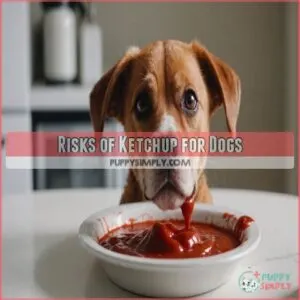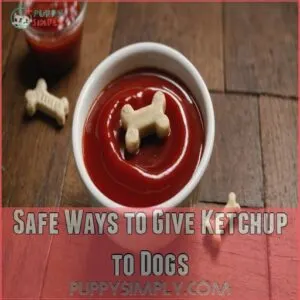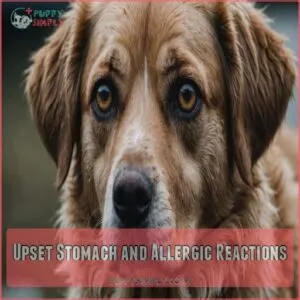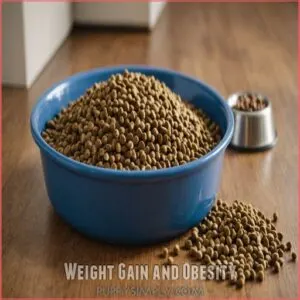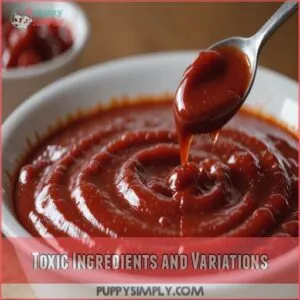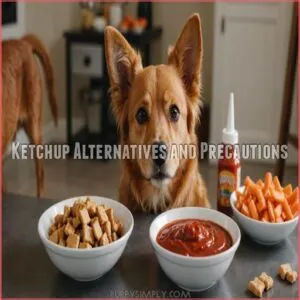This site is supported by our readers. We may earn a commission, at no cost to you, if you purchase through links.
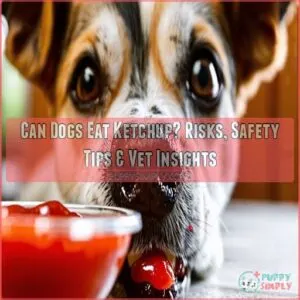 Can dogs eat ketchup? Well, technically they can, but it’s not a great idea.
Can dogs eat ketchup? Well, technically they can, but it’s not a great idea.
Ketchup often contains sugar, salt, garlic, and onion powder—ingredients that aren’t exactly dog-friendly.
A little lick might not harm your furry friend, but regular consumption could lead to upset stomachs or even more serious issues.
Think of ketchup as that tempting treat you know you shouldn’t indulge in too often!
If you’re considering using it to make food more appealing or to hide medication, explore safer alternatives instead.
Curious about the safe options and what to do in emergencies? We have tips from experts for you!
Table Of Contents
- Key Takeaways
- Risks of Ketchup for Dogs
- Benefits of Ketchup for Dogs
- Safe Ways to Give Ketchup to Dogs
- Potential Adverse Effects of Ketchup
- Ketchup Alternatives and Precautions
- What to Do if Your Dog Eats Ketchup
- Frequently Asked Questions (FAQs)
- Is ketchup bad for dogs?
- Can dogs eat ketchup chips?
- Can dogs eat ketchup without sugar?
- Can dogs with diabetes eat Ketchup?
- Can dogs have a little bit of ketchup?
- What condiments are ok for dogs?
- What if my dog eats tomato sauce?
- Can dogs eat Heinz tomato sauce?
- Is organic ketchup safer for dogs?
- Can puppies have ketchup?
- How often can dogs eat ketchup?
- Does ketchup help with canine digestion?
- Are there dog-specific ketchup brands?
- Conclusion
Key Takeaways
- Don’t feed your dog ketchup regularly; it contains high sugar and toxic ingredients like onion and garlic powder that can harm them.
- Ketchup can temporarily make dog food more appealing, but use it sparingly and opt for low-sugar, low-sodium versions when necessary.
- If your dog accidentally eats ketchup, watch for symptoms like vomiting or diarrhea, and consult a vet if any issues arise.
- Choose dog-safe treats or dog-specific ketchup alternatives to maintain your pet’s health and avoid potential risks.
Risks of Ketchup for Dogs
Let’s face it, ketchup isn’t exactly dog food.
While a tiny lick probably won’t kill them, the high sugar content and potentially toxic ingredients like onions and garlic pose real risks, from upset stomachs to more serious health problems.
High Sugar Content and Dental Issues
Feeding your dog ketchup? Beware of the sugary and sticky situation you might get into! Sugar impact on dogs can lead to dental issues and obesity.
Here’s a quick rundown:
- High sugar leads to weight gain and dog obesity.
- It harms dental hygiene.
- Dog dental care gets costly.
- Consider sugar alternatives for homemade treats.
Toxic Ingredients and Gastrointestinal Upset
It’s important to keep ketchup out of your dog’s reach.
Those sneaky condiments can contain toxic ingredients like onion and garlic powder, potentially leading to stomach upset and digestive issues.
Tomatoes bring their own risks of toxicity.
If you still want to give your dog a ketchup-like treat, consider shopping for dog safe ketchup alternatives.
Here’s a quick guide:
| Ingredient | Risk |
|---|---|
| Onion Powder | Toxic to dogs |
| Garlic Powder | Toxic to dogs |
| Tomato Toxicity | Stomach upset |
| High Sodium Levels | Digestive issues |
Ketchup isn’t a treat you want for your furry friend!
Digestive Blockages and Surgical Intervention
While ketchup’s ingredients can upset the stomach, gobbling too much might lead to digestive blockages.
If your pooch swallows it whole or with the packet, it could clog things up, causing serious dog health risks, much like when dogs eat raw chicken legs for joint health, and could clog things up, causing serious dog health risks.
Recognize signs of blockage like vomiting or lethargy, and don’t wait to call the vet.
Surgery might be the only way out, so prevention’s key!
Benefits of Ketchup for Dogs
If your furry friend turns their nose up at dinner, a tiny bit of ketchup might make their meal more appealing.
It can also cleverly disguise the taste or smell of medications, especially for those picky eaters that keep you on your toes.
Making Food More Palatable
Has your furry friend’s taste buds decided they’re simply too refined for bland food?
Picky eating in dogs can be caused by various factors, including behavioral, medical, and environmental influences, such as changes in routine or high stress levels, as outlined in Understanding Picky Eaters. Ketchup might tempt those picky eaters and make dog food a tad more palatable.
Just remember, moderation is key to dog nutrition and care.
While it sounds fun, always weigh the risks of food toxicity, keeping it a minimal splurge for your dog’s health.
Masking Taste or Smell of Medications
Think of ketchup as a sneaky ally when dog medication becomes a battle of wits.
Its flavor can effectively hide meds, making your pet’s health easier to manage.
Here’s how:
- Choose low-sugar options for canine safety.
- Mix small amounts with food to disguise tastes.
- Limit to just a teaspoon.
- Always consult your vet for pet health advice.
Helping Picky Eaters
A tiny amount of ketchup might tempt a picky eater.
However, it’s not a regular treat!
Here’s why:
| Potential Benefit | Risk |
|---|---|
| Increased palatability | High sugar content |
| Hiding medicine taste | Potential for upset stomach |
| Improved appetite | Toxic ingredients possible |
Always prioritize dog-safe treats like training treats or homemade options.
Consider dog food toppers or food puzzles to boost mealtime fun.
Pet wellness depends on the right food choices!
Safe Ways to Give Ketchup to Dogs
If you really want to give your dog a taste of ketchup, choose a low-sugar, low-sodium brand and limit their portion to one teaspoon or less.
Mix it with their food to make it more palatable and watch for any adverse reactions to keep your furry friend safe.
Choosing a Low-Sugar, Low-Sodium Brand
Regarding treating your furry friend, choosing low-sodium, low-sugar ketchup brands makes a world of difference for your dog’s safety.
Look for dog-safe ketchup to avoid potential risks like dog toxicity or dental issues.
Healthy ketchup alternatives keep your pup’s tail wagging without the worry.
After all, can dogs eat ketchup safely? With the right brand, yes!
Limiting Ketchup Intake to One Teaspoon or Less
You’re considering giving your dog a taste of ketchup, but remember to keep it to a teaspoon limit.
This tiny treat avoids the risks of xylitol poisoning and onion or garlic toxicity.
For dogs with food allergies, it’s also essential to be mindful of their regular diet, such as switching to hypoallergenic dog food options.
Opting for dog-safe ingredients with occasional small bites keeps your dog’s health in mind.
When considering safe snack options for your dog, it’s essential to avoid nuts like almonds, which can lead to pancreatitis in dogs Almonds for Dogs. Always choose dog treats or ketchup alternatives for safe snacking.
Mixing Ketchup With Food
Enhance your picky eater’s meal by mixing a small amount of ketchup with dog food.
This simple trick can help mask the taste of any supplements or medications your furry friend might need.
Choose a low-sugar, low-sodium variety to keep it safe.
Just remember, ketchup for dogs should be an occasional treat, not a regular part of their diet.
Monitoring for Adverse Reactions
After mixing ketchup with your dog’s food, it’s a good idea to think about special products like dog food ketchup that are designed to be safe for them.
Keep an eye out for symptoms like vomiting, diarrhea, or lethargy.
An allergic reaction might also occur, so stay alert.
While it may feel like you’re playing detective, your furry friend’s health is worth the effort.
If you notice any issues, contact your vet immediately.
Potential Adverse Effects of Ketchup
Feeding your dog ketchup might seem harmless, but it can lead to an upset stomach, weight gain, or even allergies due to its ingredients.
It’s important to keep an eye out for any signs of discomfort if your pet sneaks a taste, making sure their health isn’t compromised by this tangy condiment.
Upset Stomach and Allergic Reactions
Giving your dog ketchup? Even small amounts can cause problems. Some dogs get upset stomachs—think vomiting or diarrhea. Others have allergies; tomato reactions are common. Food sensitivities are a real thing!
- Imagine your dog feeling queasy.
- A sudden rash could be a sign of a ketchup allergy.
- Digestive issues can be a real pain.
Weight Gain and Obesity
Weight gain sneaks up on dogs.
It’s surprising how a small dollop of ketchup can pack extra calories.
That sugar rush does more than upset tummies; it invites unwanted pounds.
Incorporating 10 human foods for dogs like cooked, unseasoned meat and fiber-rich vegetables into their diet can be beneficial. Keep your pup trim by sticking to dog food and healthy treats.
An exercise routine is your pet’s best friend, along with careful calorie counting and weight management.
Toxic Ingredients and Variations
Ketchup may be harsh on your dog’s tummy.
Watch out for ingredients like garlic powder or onion powder, which are toxic.
Some variations contain chili powder or cayenne pepper, adding to the risk.
Be cautious of overfeeding processed snacks like Cheez-Its, which can lead to pancreatitis from high sodium.
Even fancy ones with honey mustard aren’t any better.
Keep your furry friend safe by avoiding these pitfalls:
- Onion powder
- Garlic powder
- Chili powder
- Honey mustard
Ketchup Alternatives and Precautions
If your dog is curious about ketchup, smart alternatives and safeguards can keep tails wagging without worry.
Store ketchup out of reach and choose dog-safe treats to make sure your furry friend stays healthy and happy.
Storing Ketchup Out of Reach
Dogs’ curious noses might find ketchup tempting, but you’ve got to keep it away.
Stash it high in a locked pantry, far from paw-reach.
Consider household hazards tackled and embrace a dog-proof kitchen.
To maintain a safe space for your pet, make sure to also pet-proof the home, securing potential dangers like plants and hazardous substances.
Think of ketchup like candy for kids—sweet but off-limits.
All this keeps pet safety a top priority.
Here’s a quick guide:
| Place | Storage Solution | Risk Level |
|---|---|---|
| Pantry | Locked Cabinet | Low |
| Countertop | Out of Sight | Medium |
| Floor | Easily Accessible | High |
Opting for Dog-Safe Treats and Foods
Frequently, opting for dog-safe treats and foods helps keep your furry friend’s health on track.
Skip the ketchup and consider homemade options or trusted commercial brands.
Check ingredient labels for healthy alternatives that won’t upset your pup’s tummy.
Remember, a happy dog is a healthy dog, so choose wisely, and keep those tails wagging with safe snacks!
Avoiding Unhealthy Additives
Thinking about healthier treats, consider natural alternatives to ketchup that skip the unhealthy additives.
You could whip up a homemade recipe with sugar-free options and low sodium content.
Always keep an eye on ingredient labels for any hidden nasties.
By choosing wisely, you’ll keep your furry friend safe and their tails wagging with joy!
What to Do if Your Dog Eats Ketchup
So, your dog snuck a taste of your ketchup?
Don’t panic, but keep a close eye on them for vomiting, diarrhea, or lethargy.
Contact your vet if you see anything concerning.
Monitoring for Symptoms and Contacting a Veterinarian
If your pup sneaks some ketchup, keep a close eye out for any symptoms.
Look for vomiting or diarrhea, both potential warning signs.
In case your dog has eaten ketchup, research safe products like Ketchup for dogs.
Here’s a quick checklist to follow:
- Monitor for Symptoms: Be vigilant for changes in behavior.
- Plan a Vet Visit: Consult your vet for advice.
- Prepare for Emergency Care: Know where your nearest animal hospital is.
- Recognize Dog Illness: Understand common poisoning signs.
Treating Ketchup Poisoning and Digestive Issues
While Spot’s adventures might lead him to a ketchup feast, swift action makes sure his tail stays wagging.
Start with a vet visit to rule out any serious issues.
At home, monitor him for symptoms like vomiting or diarrhea.
Keep emergency care options handy if the situation worsens.
Offer bland dog food to soothe his tummy, and consider safe alternatives for future treats.
Remember, even accidental ketchup tasting can turn into a learning moment!
Frequently Asked Questions (FAQs)
Is ketchup bad for dogs?
Ketchup isn’t great for dogs.
It’s high in sugar and might contain onions or garlic, which are toxic.
Your furry friend might end up with an upset stomach or worse.
Stick to dog-safe treats for wagging tails.
Can dogs eat ketchup chips?
Dogs shouldn’t eat ketchup chips.
These snacks contain high salt, sugar, and possibly onion or garlic powder, which can be harmful.
Choose dog-friendly treats instead to keep your pup healthy and avoid potential health issues.
Can dogs eat ketchup without sugar?
Ironically, sugar-free doesn’t mean dog-safe. Even without sugar, ketchup contains onions and garlic – toxic to dogs. Stick to dog-approved treats; your pup will thank you!
Can dogs with diabetes eat Ketchup?
If your dog has diabetes, avoid giving them ketchup.
The sugar content can negatively affect their blood sugar levels.
Stick to vet-approved treats and foods designed for diabetic dogs to maintain their health and happiness.
Can dogs have a little bit of ketchup?
Like a tiny temptation, a little ketchup might seem harmless, but it’s best avoided.
Ketchup’s high sugar and potential toxins like onion powder can upset dogs’ stomachs.
Opt for dog-safe treats to keep your pup healthy and happy.
What condiments are ok for dogs?
Most condiments aren’t dog-friendly due to sugar and salt, but plain, low-sodium peanut butter in moderation can be a treat.
Always check ingredients for xylitol, which is toxic.
For safety, stick to dog-specific treats.
What if my dog eats tomato sauce?
When your dog gobbles up tomato sauce, you’ll want to check ingredients.
Some sauces contain onions or garlic, which are harmful.
Watch for stomach upset or distress, and contact your vet if any symptoms appear.
Can dogs eat Heinz tomato sauce?
You shouldn’t feed Heinz tomato sauce to dogs.
It’s high in sugar, and it might contain garlic or onion powder, which are toxic to them.
Opt for dog-safe treats instead to keep your furry friend healthy.
Is organic ketchup safer for dogs?
Let’s debunk that myth! Organic doesn’t mean dog-safe. It still packs high sugar and potential toxins. Stick to dog-friendly treats; your pup will thank you! Keep ketchup out of reach.
Can puppies have ketchup?
Puppies shouldn’t have ketchup.
It’s not just the sugar; ketchup often contains onion or garlic powder, which is toxic to dogs.
Stick to treats designed for puppies.
Protect their health by choosing safe, nutritious options instead.
How often can dogs eat ketchup?
Dogs should avoid ketchup due to its high sugar and potential toxic ingredients like garlic or onion powder.
It isn’t safe as a regular treat.
If you’re looking for a dip, remember that salsa is off-limits due to onion toxicity risks. Instead, stick to dog-friendly snacks to keep those tails wagging safely.
Does ketchup help with canine digestion?
Some dogs also show sensitivity to salty treats like ham’s high sodium content, which can cause dehydration and other health issues. Surprisingly, 60% of dogs show mild digestive sensitivity to human foods.
Ketchup doesn’t really aid canine digestion.
Instead, its sugars and potential toxins like garlic powder can upset stomachs.
Always consult your vet before introducing new treats.
Are there dog-specific ketchup brands?
Yes, there are dog-specific ketchup brands.
These products are made with lower sugar and sodium content, aiming to be safer for dogs.
Always consult your vet before adding any new treats to your pet’s diet.
Conclusion
Think handling ketchup is challenging? Imagine explaining to your dog why it’s a no-go!
While the occasional lick mightn’t harm them, regular ketchup consumption poses risks due to high sugar and potentially toxic ingredients.
If you’re tempted to spice up your pup’s diet, remember safer, dog-friendly options exist.
Keep ketchup out of reach, explore alternatives, and consult your vet if needed.
Your dog’s health is priceless, even if they disagree on the culinary merits!

